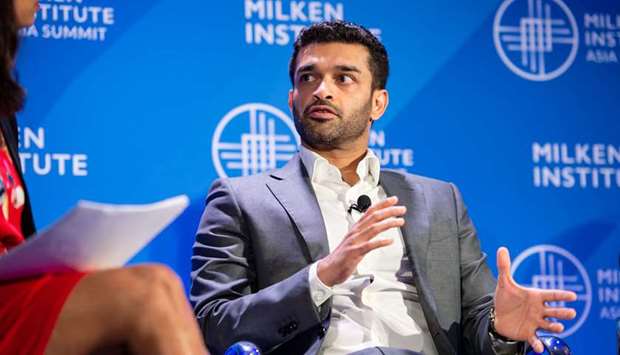Hassan al-Thawadi praised the unifying power of the FIFA World Cup and declared sustainability to be at the heart of preparations for Qatar 2022 during the Milken Institute Asia Summit in Singapore.
Al-Thawadi, secretary-general of the Supreme Committee for Delivery & Legacy, was participating in a panel session titled ‘Playing the Long Game: The Future of Sports in Asia’. The panel focused on the historic growth of the global sports market, helped in no small part by a booming fan base across Asia. Joining al-Thawadi on the panel, which was moderated by news anchor Manisha Tank, were Chase Carey, Executive Chairman & CEO, Formula 1, Derek Chang, CEO, NBA China, and Chatri Sityodtong, Founder, Chairman & CEO, ONE Championship.
Al-Thawadi said Qatar’s hosting of the World Cup, which will kick off on 21 November 2022, had the potential to unite billions of people across the globe. “The World Cup is a uniquely unifying event,” said al-Thawadi.
“It’s about showcasing pride in people’s nations, watching stories unfold that take their place in a nation’s folklore. Over half the world’s population tuned in to the final in 2018 – no other singular event has the same ability to create shared memories and unite humanity.”
Al-Thawadi said Qatar was committed to delivering a sustainable legacy – particularly when it comes to building infrastructure. Eight stadiums will host Qatar 2022 matches, including Ras Abu Aboud Stadium – which will be the first fully-demountable tournament venue in FIFA World Cup history. Many of the other stadiums are modular – meaning their capacities will be reduced after the tournament and the excess seats donated to build facilities both in Qatar and overseas. All the stadiums will feature state-of-the-art cooling technology to ensure they can be used all-year-round.
“Creating a sustainable legacy is at the core of our mission,” said al-Thawadi. “This starts with our stadiums and ensuring we avoid building infrastructure we don’t require, while contributing to football development across the world through donating the modular seats.”
Al-Thawadi added: “Our cooling technologies will ensure our stadiums are utilised year-round and the technology is already being applied in outdoor public areas in Doha. Countries with similar climates to ours will benefit from the development in this field, which is also more energy efficient than ever before.”
Qatar, which was awarded the hosting rights in 2010, has learned plenty from subsequent tournaments, along with other mega-events which delivered lasting legacies, said al-Thawadi.
“The nine years that have passed since we won the bid has allowed us to attend and observe other major sporting events in order to learn from the successes and challenges facing other host nations,” said al-Thawadi. “Russia’s Fan ID system was a very successful initiative during the 2018 World Cup and we’re looking to build on that for 2022, potentially integrating access to stadiums, public transportation and various other elements of a fan’s journey.”
Al-Thawadi continued: “We studied success stories of years gone by, such as the 1992 Olympics in Barcelona and the 2006 World Cup in Germany, and the incredible effect these had on the city and country respectively. That’s what we want to replicate in Qatar and across the region.
“This World Cup is already serving as a catalyst for accelerating social progress, as evidenced by the strides we have made in the sphere of worker welfare. It is already contributing to the national aim of diversifying our economy through enabling the development of a burgeoning sporting industry.”
Founded in 1991 by financier and philanthropist Mike Milken, the Milken Institute is a non-profit, non-partisan think-tank that helps people build meaningful lives in which they can experience health and well-being, pursue effective education and gainful employment, and access the resources required to create ever-expanding opportunities for themselves and their broader communities.
The Milken Institute Asia Summit is an invite-only event that gathers a high-level audience of regional and global leaders in finance, business, government, technology, philanthropy, academia, and media.

Hassan al-Thawadi, Secretary-General of the Supreme Committee for Delivery & Legacy, speaks at the Milken Institute Asia Summit in Singapore.
